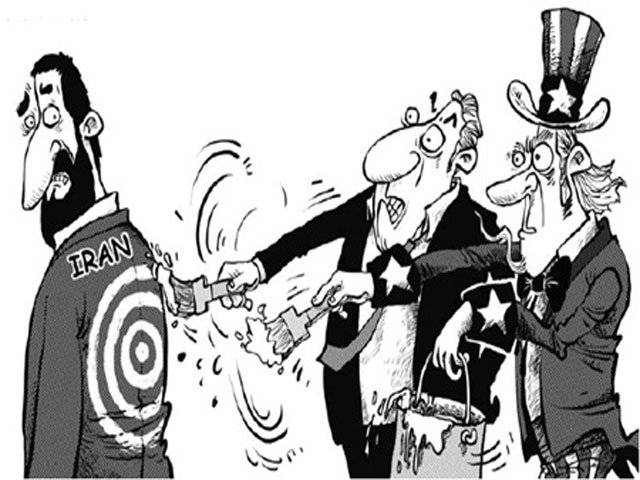Were being lied to about the purported Iranian nuclear threat, and the war party knows it. In ways eerily reminiscent of the 2002 build-up to the US invasion of Iraq, the American people are being fed a steady diet of war propaganda about Iran and its alleged quest for a nuclear weapon. As with Iraqs president, Saddam Hussain, comparisons to Hitler circa 1938 abound. Max Boot, the neoconservative columnist, is just one of many propagandists working to agitate Americans into supporting a military attack on Iran. He wrote recently, After the failure to stop Hitler and Bin Laden, among others, Westerners were said to have suffered a 'failure of imagination. We are suffering that same failure today as we fail to face up to the growing threat from the Islamic Republic. The message is unmistakable: Time is running out. Get Iran now before its too late. But despite what Boot and his ilk would have us think, there is no evidence that Iran is pursuing a nuclear weapon. The US governments dozen and a half intelligence agencies have twice said so. The latest International Atomic Energy Agency report recycled some old, discredited claims and fabricated evidence while nevertheless certifying that Iran has diverted none of its uranium to weapons production. Yet those who are bent on war are undeterred. Republican president candidates (except for Ron Paul) try to outdo each other in their anti-Iran sabre-rattling. Michele Bachmann has gone the furthest, recklessly peddling the falsehood that Irans president (who doesnt control the military) has vowed to launch a nuclear attack on Israel and the United States as soon as a bomb is in hand. This is a lie. An attack on Israel or the United States would be suicidal, and no one seriously thinks the Ayatollahs seek the destruction of Persia. Moreover, Irans leadership has issued a fatwa against nuclear weapons. Now we know that even the neocon vanguard doesnt believe its own propaganda. Occasionally, leading neoconservative intellectuals forget that the wider world is listening and say things that belie their own case for war. Take, for example, Danielle Pletka, vice president for foreign and defence policy studies at the American Enterprise Institute. In a recent video statement Pletka said, The biggest problem for the United States is not Iran getting a nuclear weapon and testing it, its Iran getting a nuclear weapon and not using it. Because the second that they have one and they dont do anything bad, all of the naysayers are going to come back and say, See, we told you Iran is a responsible power. We told you that Iran wasnt getting nuclear weapons in order to use them immediately. And they will eventually define Iran with nuclear weapons as not a problem. Let that sink in: the biggest biggest problem with Irans acquiring a nuclear weapon is that it might not use it. Got that? And why would that be bad? Because naysayers (that is, people against war) would be able to point to Irans responsible conduct as proof that Iran is not irresponsible. Imagine that Pletka leaves the implication that the US government should attack Iran, which would devastate that country and murder countless innocent people, in order to stop it from demonstrating that it is not a reckless, insane, and suicidal power in the Middle East. Has there ever been a worse reason to launch a war? This is what passes for reason and logic among our serious foreign-policy thinkers in Washington. These are the same people who gave us Operation Iraqi Freedom, which killed or injured hundreds of thousands and created four million refugees. But those who are prepared to sacrifice innocent Iranians to solve this problem arent mad. In their worldview, they are right to worry about Iran being perceived as a responsible power. Pletkas colleague Thomas Donnelly spelled it out in The Weekly Standard: Were fixated on the Iranian nuclear programme while the Tehran regime has its eyes on the real prize: the balance of power in the Persian Gulf and the greater Middle East. In other words, how dare a country located in the Middle East aspire to challenge the American empires dominance there Sheldon Richman is senior fellow at The Future of Freedom Foundation in Fairfax, Va., author of Tethered Citizens: Time to Repeal the Welfare State, and editor of The Freeman magazine. Future of Freedom Foundation
Friday, April 26, 2024
Neocons dont believe their own anti-Iran propaganda

9:54 AM | April 26, 2024
18 matches decided on second day of PFF Futsal National Cup Phase 5
6:33 PM | April 26, 2024
Man City hammer Brighton 4-0 to be hot on English leaders Arsenal's trail
6:29 PM | April 26, 2024
Warriors guard Stephen Curry named NBA Clutch Player of the Year
6:28 PM | April 26, 2024
ECP releases notification of victorious candidates in by-election
6:26 PM | April 26, 2024
Economic Challenges
April 26, 2024
No Compromise
April 26, 2024
Strength and Solidarity
April 26, 2024
Musk vs Australia
April 25, 2024
Reforming Rehab
April 25, 2024
Photon power
April 26, 2024
Justice prevails
April 26, 2024
Ending animal suffering
April 25, 2024
AI governance
April 25, 2024
AI concerns
April 25, 2024
ePaper - Nawaiwaqt
Advertisement
Nawaiwaqt Group | Copyright © 2024





